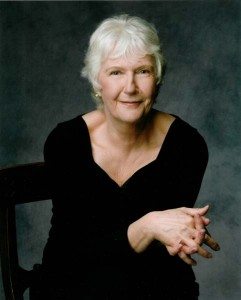 A Killing Snow runs June 23 to August 13 and features Patricia Hamilton of Green Gables fame
A Killing Snow runs June 23 to August 13 and features Patricia Hamilton of Green Gables fame
Patricia Hamilton is a Canadian icon best known as Rachel Lynde in Anne of Green Gables and Road to Avonlea. A long-time stage performer at Shaw Festival and other theatres, she makes her Blyth Festival debut in Grand Bend resident Paul Ciufo’s A Killing Snow, which runs June 23 to August 13.
Nominated for the Governor-General’s award for drama for his play Reverend Jonah, Ciufo’s follow-up was inspired by the 2007 murders of Bill and Helene Regier, and focuses on the way people react to such events. “The panic people were feeling, and also the feeling of how could something like that happen here,” Ciufo says. “I explored that fear in a different way. My way of exploring that is writing a play.”
The play also examines the surprising complexity of small town life. One character is a pig farmer who also models. Patricia Hamilton’s character runs a lunch place in Clinton, but is also a psychic. Big cities aren’t always as dangerous as we think, and small towns aren’t always safe. These ideas are brought to light in a thrilling ensemble piece, and Casey Lessard spoke with star Patricia Hamilton to learn more.
Interview by Casey Lessard
Photo courtesy Blyth Festival
You are performing in Paul Ciufo’s play A Killing Snow. Tell me about the play and your role.
It’s a murder mystery about a group of people who get stuck in a farmhouse for four days because they can’t get on the road due to whiteouts. Murders ensue.
I play a middle-aged woman with a grown-up family who is on the road and ends up at this place. Her old lover owns the house and she hasn’t had anything to do with him for a long, long time. One of the other people stuck is her daughter’s ex-boyfriend. They all know each other, so when people start dying, you wonder who is killing whom.
It’s an interesting play by Paul because he doesn’t only write murder mysteries. He’s trying to broaden his writing. If you get a good murder mystery, it will do the circuit and can make the playwright some money.
I take it there aren’t very many older women in theatre; it’s really a young people’s game. Does that give you an advantage?
I think it does. There are a lot of plays being written about older people. The baby boomers are interested in people their own age and the problems of those people. I think you will see a lot of plays about people of that group. They’re going to see things that interest them about themselves. The second play I’m doing here at Blyth is called Pearl Gidley, and it’s about two elderly women living together in Blyth in 1969 who take in a boarder who is a deserter from the Vietnam War. It will speak to the audiences that come to Blyth.
Most people would recognize you from the role of Rachel Lynde, but you’ve been doing much more over the years as an actress. What has brought you to perform for the first time at Blyth?
I like the theatre more than I like television and film, although the Green Gables stuff was fantastic. I did it for seven seasons plus the four movies, so I played that role for about a decade. But I really am a theatre actress mainly, and I love working in repertory theatre, which is what they do at Blyth.
For the last 12 years, I have been at Shaw Festival, and I love doing that. Before that, I used to do a lot of new Canadian plays. There is nothing more wonderful than being the first person to say a writer’s words on stage.
Our most memorable moment from your career is in Road to Avonlea, where Rachel Lynde has a stroke. It’s such a touching concept.
That series was very good to work on, and it was given good production values from the beginning. And it was about an iconic book that every Canadian girl had read as a child. As we went along, the scriptwriter had already seen what I could do, so that script was written for me. When you got an episode where you were featured, like that one, it’s very exciting.
Sarah Polley was also in that show. She directed a film called Away From Her (adapted from a story by Alice Munro) about Alzheimer’s. It’s so interesting that you’re able to perform acts of reality for older people, for example strokes. Other Canadian films are also about this reality, for example Juno. Do you think we are different from the Americans in what we’re doing?
Yes. That’s one of the reasons we fight so passionately to have our own culture. We are not like the Americans in so many ways. Our culture should reflect who we are. We have to stand up for our culture, and Blyth is a place that really does that.
What’s special about Canadian theatre in particular?
It’s ours. We’re writing about what we know. And the actors who live in Canada have a better chance of being able to perform it because we know it. It’s fun to do plays about a place you know. That’s what Anne of Green Gables was about, too. It’s about doing things that are part of your culture.
I’m an actor. I’m a Canadian actor. I love performing on stage, and I love it in all its forms. There are plays from all over the world that attract me. I look for plays where there is a part for me, where it has something interesting to say, and where I can work with congenial comrades, all of which is true at Blyth.

